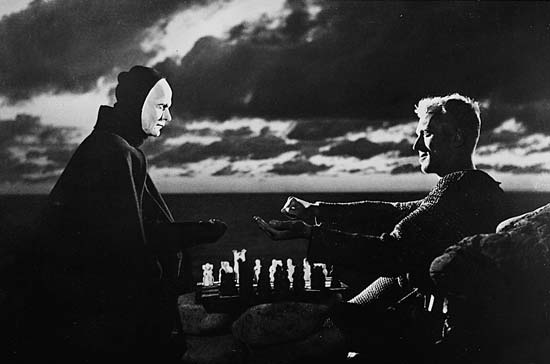Ingmar Bergman’s “The Seventh Seal” (1957)
by Nathalia Joukova Edholm
Source: senseofcinema.com
In honour of the Swedish filmmaker Ingmar Bergman’s 100th anniversary, we will look deeper into one of his most iconic films, The Seventh Seal (Det Sjunde Inseglet), a movie that triumphs in its depiction of humanity’s relationship to death in a time when it is a most intimate component of our lives.
“Who are you?”
“I am Death /…/ Are you ready?”
“My body is ready, but I am not”
So goes the famous dialogue between the knight Antonius Block and Death himself, a dialogue so well remembered even 61 years after its premiere. It is not surprising, since few scenes so directly confront the universal fear of death—we are never quite ready for it. Nevertheless, it has been, and will presumably continue to be, an inevitable part of life. Many anthropologists have considered the role death plays in life. Our very own Bronislaw Malinowski in “Magic, Science and Religion” emphasises rituals that mend the social disorder in events of death, where the body is purified in order to foster an idea of an immortal spirit. Some thinkers such as Ernest Becker and Zygmunt Bauman go even further by claiming that the universal human fear of death is one of our strongest inner drives. In order to escape death, we subconsciously try to immortalise ourselves through genealogical procreation, the making of art, and the following of religious faith. Human life seems, ironically, to be intimately connected to death. So, how does human life and thought react as death takes enormous and arguably unnatural proportions, such as of the Black Plague in the middle ages?
'Bad death' is the opposite of an expected 'good death'. Survivors left in despair, hopeless in the face of evil. The Plague, estimated to have killed 30-60% of Europe’s population in a matter of decades, could probably count as its archetype. As the film begins, the main character Antonius Block, a knight returning from the crusades, encounters Death who has come to take him away. Antonius, reflecting the human tendency to elude death, challenges Death to a chess match in order to postpone the inevitable. During the match, he experiences a crisis of faith in God, a fact that makes death even more daunting. “Is it so terribly inconceivable to comprehend God with one's senses? Why does he hide in a cloud of half-promises and unseen miracles?”. The loss of faith, presumably a result from his experiences in the crusades, makes death seem devoid of meaning and substance. Echoing the futility of life, he confesses to Death: “we must make an idol out of fear, and call it God.”
Not all characters in the film adopt the same defeatist view of death. On the contrary, the role of religion grows alongside that of death. Monks speak of the sins of men that initially brought the Plague as a punishment from God (the HIV epidemic, anyone?). Cults of people reenact the suffering of Jesus through whipping themselves—and as such, society and meaning are reconstructed as physical suffering, that still seems less painful than a meaningless existence. Other characters, such as the macho squire Jöns, adopt an arguably nihilist and hedonistic worldview. Jöns dismisses love as nothing more than worldly lust and proceeds to ask for the bottle after observing painted murals depicting death, doing so in a desperate effort to forget its lurking presence. Finally, a farmer (who some would regard as simple) comments, regarding the Judgment Day: “if it is as they say one can only take care of one’s house and live happily as long as one stands on one’s bare legs.”
Bergman’s fluency in black comedy is displayed throughout the film and reveals itself in the best light in one particular scene. An actor, encountering Death, attempts to negotiate: “I haven’t got time… my performance [tomorrow]… is there no exemption for actors?”. Presenting morbid matters through humorous dialogues, the audience is allowed to playfully reflect over the often suppressed knowledge of one’s own mortality and what it does to oneself. As the Church painter said to Jöns: “Why should one always make people happy? It might be a good idea to scare them once in a while.”
